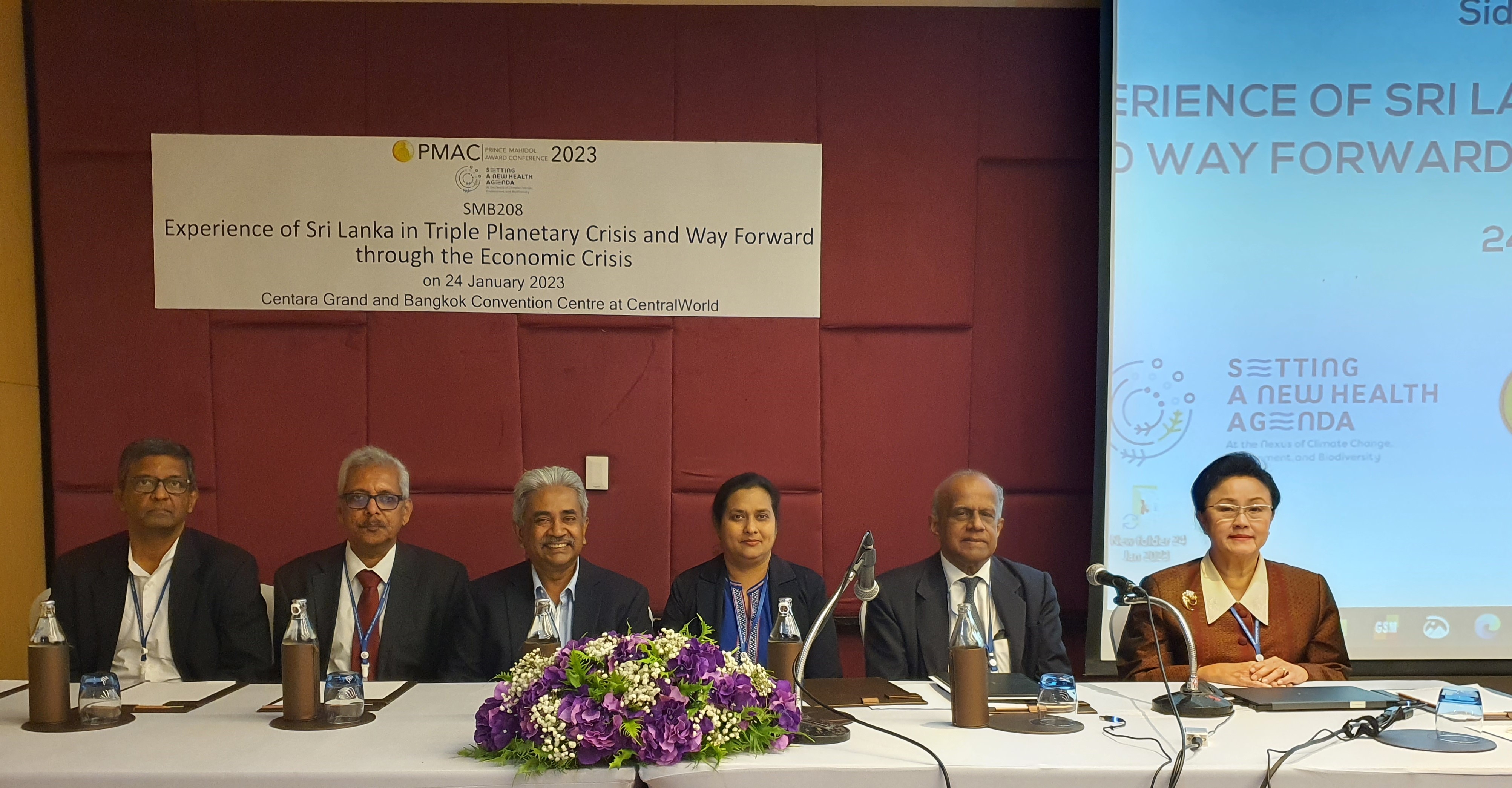 The triple planetary crisis – Climate Change, Air Pollution, and Biodiversity Loss – has been identified as the most significant health threat of the 21st century. It endangers billions of lives and livelihoods across every continent and threatens the systems upon which we all depend.
The triple planetary crisis – Climate Change, Air Pollution, and Biodiversity Loss – has been identified as the most significant health threat of the 21st century. It endangers billions of lives and livelihoods across every continent and threatens the systems upon which we all depend.
The relationship between climate change, air pollution, biodiversity loss and human health is complex. It threatens the essential ingredients of good health - clean air, safe drinking water, nutritious food supply, and security - and it undermines decades of progress in global health, poverty alleviation and social development.
The Prince Mahidol Award Conference is a global multi-stakeholder platform that enables complex dialogues, stimulates inter-sectoral and interdisciplinary collaboration among countries, sectors and disciplines, and sends positive signals for scaling up efforts to tackle global challenges.
In an effort to raise awareness and create dialogue in this global platform the Ministry of Health and Ministry of Environment of Sri Lanka in collaboration with WHO country office presented the country’s experience in tackling triple planetary crisis as an island nation.
Held on 24 January 2023 the side meeting was moderated by Dr Palitha Abeykoon, member of the WHO Global Pandemic Preparedness Monitoring Board.
The line-up of speakers included Professor Ajith De Alwis, University of Moratuwa, Sri Lanka, who shared key findings from the ‘Xpress Pearl’ disaster and its impact on coastal, marine environments and lessons for future.
Dr Anil Jasinghe, Secretary, Ministry of Environment, Sri Lanka, enlightened the audience on the role of the Ministry of Environment. He mentioned that the country is striving to achieve emission reduction targets under the UN Framework Convention for Climate Change and carbon neutrality by 2050. The country also hopes to secure 70% of its energy requirement through renewable sources by 2030. In line with these targets the Ministry has established provincial climate change cells for the implementation of actions undertaken in provincial areas.
Representation from Environmental and Occupational Health Unit of the Ministry of Health included Dr Tilak Siriwardena and Dr Inoka Suraweera who shed light on the health sector initiatives in addressing environmental health in Sri Lanka.
Dr Vinya Ariyaratne, President Sarvodaya Shramadana Movement & President, Sri Lanka Medical Association, provided critical insights on community engagement in environment-friendly initiatives and green efforts.
Bringing in the Thailand experience on addressing the health challenges of triple planetary crisis was Dr Monthip Sriratana, Senior advisor to the National Research Council of Thailand.
The regional perspectives to the discussion were added by Dr Hassan Mohd Nasir, WHO Regional Advisor on Environmental Health, Air Pollution, Occupational Health and Chemical Safety in the South-East Asia Region.
Key points highlighted during the discussion included challenges Sri Lanka is facing as an island nation in the face of the climate crisis and the way forward.
Sri Lanka’s per capita green house gas emission is slightly over 1 tonne, and the world average is 4.82 tonnes. Despite the comparatively low green house gas emissions, Sri Lanka has been one of the top ten countries to be adversely affected by climate change according to the annual climate risk index.
Sri Lanka -as an island nation- highly dependent on rainfall for livelihoods, agriculture and hydropower- has been feeling the adverse effects of the changes in rainfall pattern causing droughts, floods and overall reduction of ground water availability.
Being a biologic hotspot in the world, the country has a rich diversity of flora and fauna. With the increasing population and industrialization, Sri Lanka is facing severe challenges in preserving its biodiversity, watersheds and natural forest cover.
The health and environment scorecard for Sri Lanka estimates that there will be 250 ‘warm spell’ days and 10 heat deaths per 100 000 people in the ages 65 and above in 2050 under a high emissions scenario. 69 % of the population in the country is devoid of clean fuels and technology for cooking. 37% of deaths from diarrhoea is caused by unsafe drinking water, sanitation and inadequate personal hygiene, and 30% of rural healthcare facilities are lacking basic healthcare waste management. The country has its own challenges in the health and environment nexus.
The recent Xpress Pearl disaster created long lasting challenges on the coastal and marine environments including the discharge of 11000 MT of polymers, 8000 MT of chemicals, 3400 MT of metals and several other contaminants. Beaches and turtle nesting-sites across the area were affected
by deposition of plastic nurdles. Significant chronic effects of the disaster are expected due to bioaccumulation at higher trophic levels.
Sri Lanka needs to be well prepared to face a changing climate and environment. The impact of climate change to healthcare as well as the impact of healthcare decisions on climate change both need to be considered Actions in this direction include, bringing health to the centre of the climate crisis and environmental initiatives, and building climate resilient and low carbon sustainable health systems.
To operationalise it, a strong inter-sectoral collaboration, intra-sectoral coordination, preventive-curative partnerships using existing platforms of service delivery and engaging communities for action are needed.
